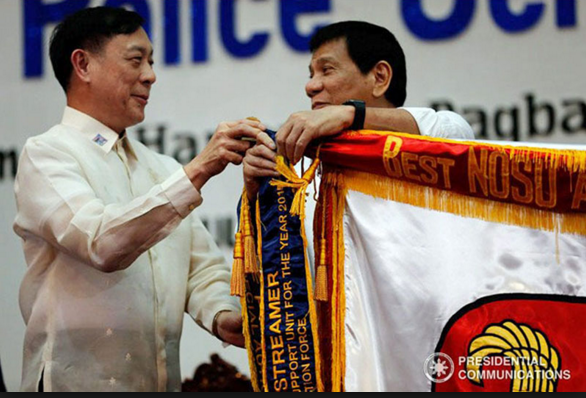
MANILA, Philippines – Department of Interior and Local Government (DILG) Officer-In-Charge (OIC) Catalino Cuy has ordered an investigation on claims that one of the agency’s partner-organizations was allegedly collecting significant amounts of money from different barangays in an anti-illegal drugs project.
The directive came after the DILG received reports that the non-governmental organization Drug Abuse Warning Network Inc. (DAWN) was allegedly charging barangays P75,000 for each set of its software and hardware for the DILG’s MASA MASID (Mamamayang Ayaw sa Anomalya, Mamamayang Ayaw sa Iligal na Droga) Database and Reporting System (MMDRS) project.
“We have received reports about the irregular activities of DAWN which may be considered as material misrepresentation and violation to the agreement it has entered with the DILG,” Cuy said in a statement issued Tuesday, April 25.
“For this, I have ordered an investigation on the matter and pending thereof, prudence dictates that the aforesaid partnership with DAWN be suspended until further notice,” he added.
InterAksyon tried but failed to get the side of DAWN regarding the issue as of posting time.
Based on their memorandum of agreement forged on January 2017, the DAWN offered to donate its data gathering and analysis software system for MASA MASID to monitor drug-related incidents in the community.
Called DAWN 2016, the software system would gather data on suspected drug users and pushers in communities and electronically forward the same to concerned government and law enforcement agencies for further verification and appropriate action.
Cuy said the procurement by the barangays of the MMDRS hardware was neither mentioned in the MOA nor was this disclosed during the meetings between the two parties.
“We would like to emphasize that the DILG, in entering into a MOA with DAWN, was not in any way engaged with a procurement of software or hardware or any other goods. It is very clear in the MOA that the DAWN system shall be donated to the Department at no cost to the DILG,” he said.
The DILG OIC had already suspended its partnership with the NGO and had directed his officials from the legal and internal audit department to lead the probe on the software project and to submit a comprehensive report on their findings.
He said he had also advised other DILG officials and the local chief executives of the suspension.
DILG’s MASA MASID project is the agency’s flagship program on anti-illegal drugs. It is a community-based program aimed to encourage communities to take proactive stand against the government’s fight against corruption, illegal drugs, and criminality.
The program has four main thrusts: information and education campaign in communities, creation of a reporting mechanism on illegal drugs-related activities, formulation of community-based rehabilitation programs, and volunteerism.
About DAWN and its incorporators
A quick look at Securities and Exchange Commission records of DAWN showed that the organization has been operating for 17 years as a non-stock corporation.
It has listed itself as an NGO engaged in assisting “the monitoring of drug abuse or presence of prohibited drugs in an area, in disseminating “information about the ill effects of drugs,” and in assisting the “restoration of moral, physical and spiritual value” and counseling of drug dependents as well as referring them authorized rehabilitation centers.
DAWN’s chairman, Dr. Carlito Cubelo, is also the president of Dragnet Corp. and CBC Age Management Clinic.
In a Philstar article, Cubelo was quoted as saying that DAWN’s key strategy was to “address the [illegal drug] problem at its very roots — the barangays.”
He said the NGO would be composed of barangay volunteers who would spot drug traders and users and report them to the police for a prompt apprehension of offenders and seizure of drugs in their possession.
Cubelo was also the president and chief executive officer of Mahogany Medical and Pharmaceutical Supplies Inc. (MMPSI) from 1997 to 2000, which had introduced drug testing kits in the Philippines.
The pharmaceutical company was once involved in a controversy when a graft complaint was filed against former DILG Secretary Ronaldo Puno over the P3.6 billion drug testing deal in March 1999 between the PNP and the MMPSI.
The Sandiganbayan dismissed the case against Puno in 2003.
Cubelo was also present as president of the MMPSI during a Senate inquiry into the controversial mandatory drug tests for police officers. He told a Senate committee that he was allegedly forced by the husband of the late senator Miriam Defensor Santiago, Narciso “Jun” Santiago, former DILG undersecretary, “to sign documents that would be derogatory to former Local Government Secretary Puno,” according to a Newsbreak article.
Miriam reportedly lashed out at Cubelo and told him, “You lying little bastard… You are under oath.”
After his stint at the MMPSI, Cubelo became executive director and over-all coordinator at the Committee on Dangerous Drugs at both chambers of Congress from 2001 to 2004.
Other DAWN incorporators are Joseph Cubelo, Fe Cepeda, Daniel Espina, and Norberto Garcia.
In 2010, both Carlito and Joseph Cubelo ran for a seat at the House of Representative under the party-list SMART or the Social Movement for Active Reform and Transparency but lost.
Another nominee under the party-list was Jose C. Calida, the current solicitor general.
They attempted to run again in the 2013 elections, without Calida, but the Commission on Elections canceled the registration and accreditation of their party-list group.









